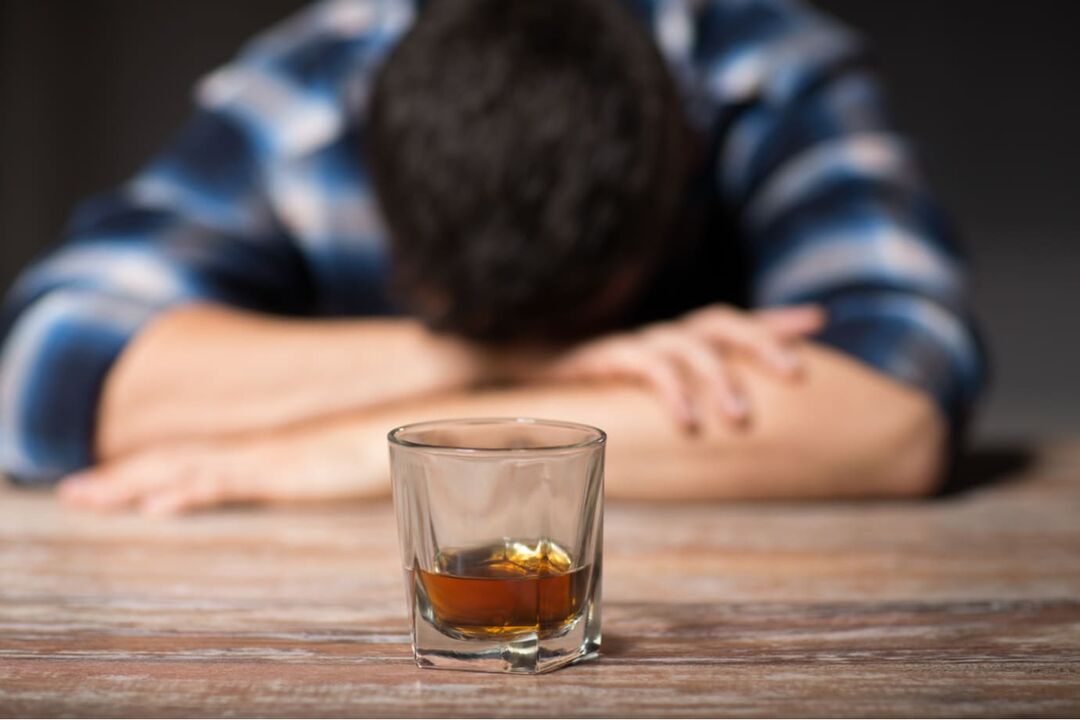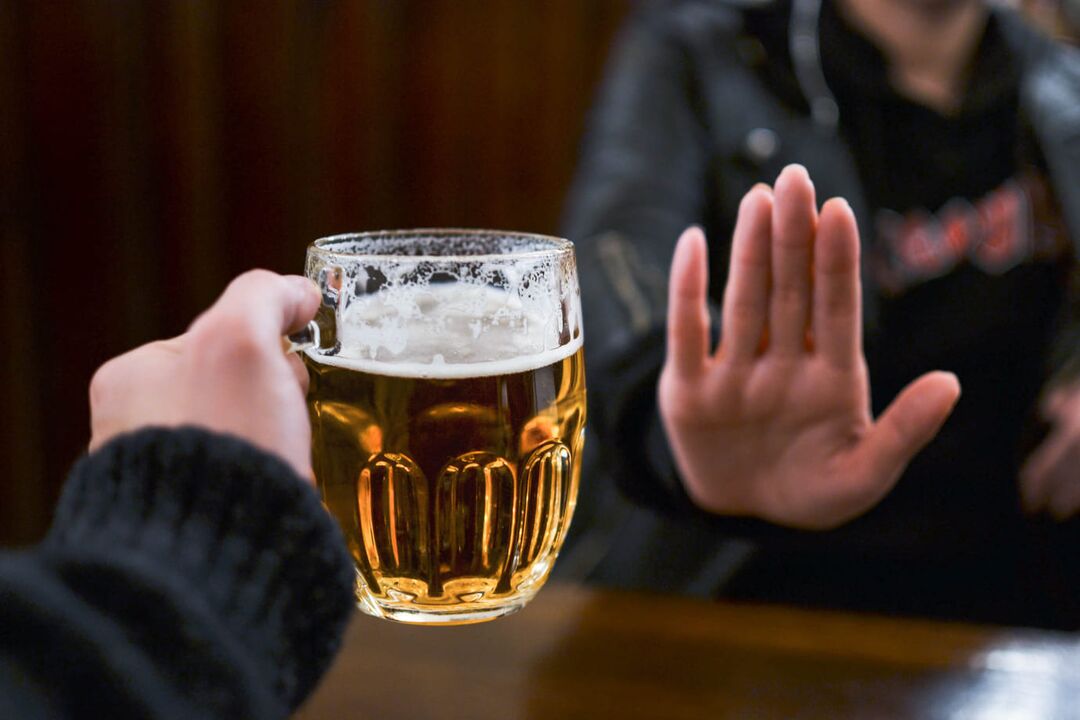Is it possible to stop drinking abruptly - certainly, especially with a firm determination to consume alcohol on a daily basis. Yes, it won’t be easy, but the "pros" of a healthy lifestyle will be assessed much faster. Narcologists compare the gradual decrease in the amount of alcoholic beverages to the partial cutting of the tail. At some point, a person who drinks regularly can easily break free. In order not to start all over again, it is advisable to go through a temporary deterioration in well-being.
Sudden rejection of alcohol - interesting reactions of the body
Alcoholism is both a physical and psychological dependence on ethyl alcohol. Therefore, when it suddenly ceases to enter the body, an immediate reaction follows from almost every vital system. Not surprisingly, they now need to operate in modified mode. But don’t pay attention to the temporary deterioration in health because "friendship" with ethanol is expensive for the body. Here are the expected consequences of alcohol consumption in the first few days:
- weight loss due to suppression of appetite;
- insomnia followed by drowsiness;
- dull migraine type headache;
- psychoemotional instability - irritability, unreasonable anxiety, apathy;
- mild migrating joint pain, trembling of fingers.
It sounds scary, but these withdrawal symptoms are more common in older alcoholics. If a person uses little but every day, the physical condition practically does not deteriorate. The only psychological discomfort is the usual bottle of beer without a glass of wine or 50-100 grams of vodka.
What is the reason why the body reacts so violently to a sharp rejection of a drink? The fact that ethanol is incorporated into biochemical reactions becomes an equal participant. When you try to remove it from there, a temporary error occurs in the body. You now need to regulate the nervous system, cope with producing the optimal amount of digestive enzymes, and repair damaged liver and urinary organs. It takes about 1-1, 5 months to cope with these tasks.

Typical signs of alcohol withdrawal
How to give up alcohol permanently - full mobilization of willpower is only necessary in the case of systematic household drunkenness. In such cases, one drinks a lot, often, constantly experiencing all the "pleasures" of a hangover. After having problems with your psyche, heart, and liver during your next snack, you definitely decide to "quit. "What awaits the alcoholic:
- One day. Withdrawal symptoms are immediately triggered by nausea and vomiting, headaches, severe tremors and, of course, unbearable longing. In fact, the first day of sobriety will be a test of strength for the alcoholic. If you can resist without alcohol, your chances of overcoming addiction will skyrocket;
- 2-7 days. During this period, the alcoholic feels unwell - the body demands the usual amount of alcohol, punishing the "owner" with headaches, visual and auditory hallucinations, trembling of the arms and legs. Digestion and peristalsis are upset, and the prospects for a healthy lifestyle don’t seem so bright to the alcoholic. At this stage, don’t give up, medications and sleep will help you to the end;
- 8 days. To make it a little easier, the improvements are noticeable to the naked eye. The severity of the withdrawal syndrome decreases, the body adapts well to the changed living conditions. Now he is busy restoring organs and tissues, learning full work without ethanol. Headaches, nausea, and irritability recede because ethyl alcohol and its toxic metabolites no longer circulate in the blood;
- 30-40 days. That's all - now one can give advice on giving up alcohol. Lightness appears in the body, physical and mental performance improves, and professional skills that seem lost are returned. All vital systems work perfectly, the body works like an hour. But don’t rest - during this period, even a sip of beer can cause a malfunction.
And now a little fly in the ointment. If a person drank a lot and often, his internal organs were constantly exposed to ethanol. In a state of intoxication, the cells were destroyed without subsequent recovery. Chronic diseases developed that the alcoholic had no idea. After all, each alarming symptom was suppressed by a different dose of alcohol. But outside the state of euphoria, one cannot fail to notice them. It’s time for a full medical examination. After the diagnosis, the doctor prepares the appropriate therapeutic regimen and prescribes the medications.
The sad consequences of a long alcoholic experience are fatty degeneration of the liver, hepatitis, nephrosis, atrophic gastritis, or high acidity. All pathologies are severe but completely curable, so the prognosis is favorable. So a sharp rejection of alcohol sometimes avoids disability and even death. After all, while an alcoholic tries to "quit" by reducing the dose, dangerous diseases develop, develop, and recur in his body.

We will help you in any way - advice for those who choose to "conclude" quickly
The decision to stop drinking is often made spontaneously when a person suddenly realizes that there is a stroke, heart attack, or cirrhosis around the corner. Therefore, there is no time to prepare for the impending alcohol withdrawal after alcohol consumption. Unlike relatives, family members who are able to quickly find all the information they need. One has to help one to quit drinking, support him, replace his shoulder at a difficult stage of life.
The breakdown is more than real in the first two weeks, so it makes sense to see a professional doctor. The transition to a sober lifestyle will be facilitated with pharmacological support. Parenteral administration of saline solutions, B vitamins, sedatives and anticonvulsants, respiratory analeptics, antiarrhythmics, nootropics helps. The results of the medical intervention are obvious:
- cardiac activity and respiration return to normal;
- sleep and appetite are restored;
- nausea and vomiting cease after the next meal.
How to stop drinking suddenly - just by combining willpower, medication and psychological support. The latter is very important because the state of the central nervous system changes dramatically. As long as you adapt to work without ethanol, the person overcoming the addiction will suffer from hallucinations. He talks to imaginary interlocutors, retreats for several hours, and even sings. It is not worth focusing on this - the psyche recovers after harmful substances have been emptied from the body.
Proper rehabilitation - learning to live again
It is a burning question of how to completely give up alcohol. Narcologists note that the likelihood of long-term remission is greatly increased by a person’s active desire to refuse alcohol consumption. Therefore, when making an important decision about alcohol consumption, you need to understand that now anything that contains ethanol is strictly prohibited.
Without preparation, it is difficult to separate from alcohol forever. Once you have overcome the most difficult early days of withdrawal symptoms, you should look for additional resources to alleviate your physical and psychological condition:
- Remove fatty and fried foods, foods saturated with salt and spices from your regular diet.
- Walk in the fresh air for 1-2 hours, at least once a day.
- They go back to their old hobbies, one that showed interest in immersing themselves in unlimited drunkenness.
The transition to a sober lifestyle is gradual. One is often desperate, seeing the future only in black. Then he pulls himself together, persuading him not to give up, again participating in solving family problems. Narcologists advise to speed up healing with physical activity. You don’t have to go straight to the gym or run long distances. Gentle physiotherapy is a great way to recover quickly.































